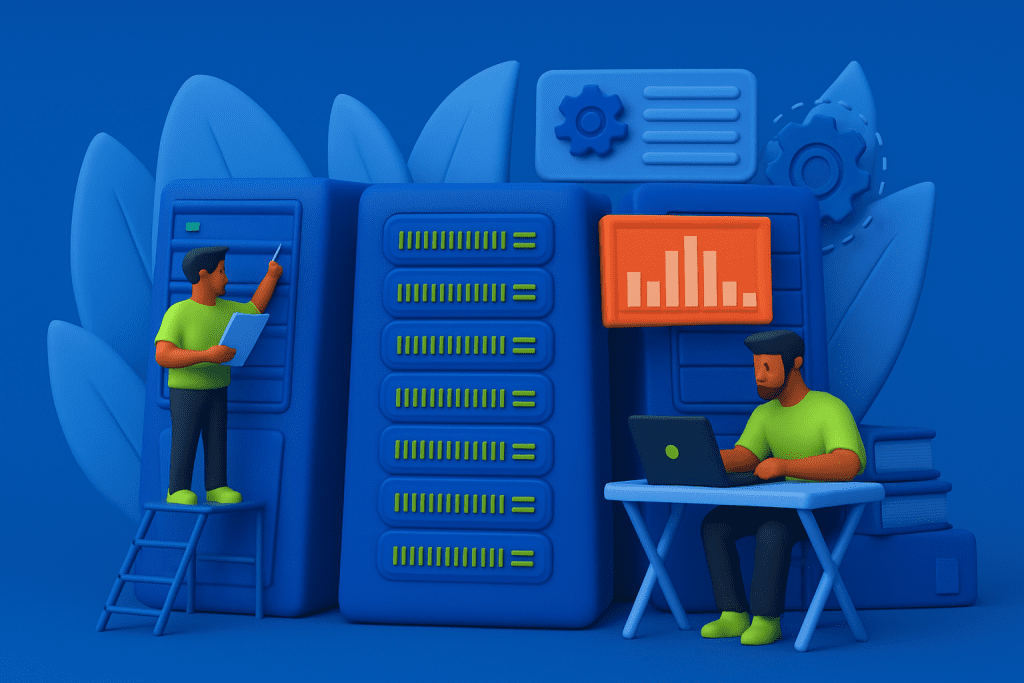When you choose a Virtual Private Server (VPS) for your website or application, you’re not just getting space on a server — you’re getting a slice of powerful hosting resources that act like your own dedicated environment. Unlike shared hosting, where you have limited control, a VPS gives you more freedom to customize, configure, and optimize how your server works. This control can make a huge difference in how your site performs and how secure it is.
For businesses, having control over the hosting environment means they can fine-tune performance, install custom applications, and strengthen security based on their specific needs. Developers, on the other hand, often need the ability to experiment, run scripts, and deploy software that shared hosting simply won’t allow. This level of control is what sets VPS hosting apart and why it is preferred by growing businesses, agencies, and tech teams.
However, not all VPS setups offer the same level of control. This is where root access comes in. Root access is the highest level of control you can have over your VPS. It allows you to manage every aspect of the server — from software installations to security settings — without restrictions. While this power can unlock many possibilities, it also comes with responsibilities. Understanding what root access is, how it works, and whether you actually need it is key to making the right hosting decision.
What Is Root Access?
Root access is the highest level of permission you can have on a server. It’s like being the administrator of your own computer, but for your VPS. Just as an admin account on a PC or Mac lets you install programs, change system settings, and manage user accounts, root access gives you full control over every part of your virtual server.
With root access, you are not limited by the default settings or restrictions that hosting providers often place on shared hosting accounts. You can install custom software, configure server settings to match your exact needs, and manage security at a much deeper level. This is why root access is so valuable to developers and advanced users who want to customize their hosting environment completely.
In simple terms, think of it like this: on shared hosting, you’re just a guest with limited permissions. On a VPS with root access, you’re the owner of the house, free to arrange, modify, or even rebuild it as you like.
How Root Access Works in a VPS Environment
In a VPS environment, your server is isolated from other users, giving you a private space to run your websites and applications. When you have root access, you gain full administrative rights to this private server. This means there are no restrictions on what you can install, modify, or remove — you have the same level of control that a system administrator would have on a physical machine.
With root access, you can:
- Install any software or applications you need, without waiting for the hosting provider to support them.
- Modify server configurations to optimize performance, security, or compatibility with your projects.
- Manage user accounts and permissions, giving or limiting access to team members as required.
- Set up custom firewalls, security rules, and monitoring tools to protect your data.
- Access and edit all server files, including critical system files, giving you full flexibility over how your VPS operates.
Essentially, root access puts you in the driver’s seat of your VPS. You are free to customize the server to fit your exact needs, whether it’s hosting a complex web application, running specialized services, or optimizing performance for high-traffic websites. However, with this power comes responsibility — any incorrect changes can impact the server’s stability or security, which is why it’s best suited for users who have at least some technical knowledge.
Benefits of Having Root Access
Having root access on your VPS opens up a world of possibilities. It gives you the same level of control as a system administrator, allowing you to shape your hosting environment exactly the way you want. Here are some of the main benefits:
1. Complete Flexibility
With root access, you’re not limited to the software and settings that come pre-installed. You can add new tools, remove unwanted programs, and make changes without needing approval from the hosting provider. This flexibility is especially valuable for developers who need to work with specific frameworks, libraries, or custom server setups.
2. Full Customization
Every business or project has unique requirements. Root access lets you configure the server to match those needs perfectly. You can adjust server parameters, set up custom caching, or fine-tune resources to handle high traffic efficiently. This level of customization is impossible on shared hosting and even limited on some managed VPS solutions.
3. Performance Tuning
When you have control over every aspect of the server, you can optimize it for speed and reliability. For example, you can choose lightweight software stacks, enable performance-enhancing modules, and allocate resources in a way that suits your workload. This results in faster load times and better overall performance for your websites or applications.
4. Enhanced Security Control
Security is a top priority for any online business. With root access, you can set up custom firewalls, install advanced monitoring tools, and apply security patches on your schedule. You can also remove unnecessary services that might pose vulnerabilities. This proactive control gives you a stronger defense against cyber threats.
In short, root access gives you freedom and control. You decide how your VPS runs, making it a powerful choice for businesses, agencies, and developers who want more than just standard hosting.
Potential Risks of Root Access
While root access provides unmatched control, it also comes with certain risks if not handled carefully. The same permissions that allow you to customize everything can also lead to mistakes or vulnerabilities that impact your server’s performance and security.
1. Risk of Misconfiguration
With root access, you can modify critical system files and server settings. However, one wrong command or incorrect configuration can break important services or even make the server unusable. Unlike shared hosting, where the provider manages these aspects, you’re fully responsible for keeping the system running correctly.
2. Security Vulnerabilities
Greater control also means greater responsibility for security. If you don’t regularly update software, configure firewalls, or monitor for threats, your server can become a target for hackers. Installing unverified scripts or poorly secured applications can open backdoors that compromise sensitive data.
3. Data Loss
Having root access means you have the power to delete or overwrite any file on the server — even critical ones. Without proper backups, a small mistake can result in the loss of important data or entire websites.
Because of these risks, root access is best suited for users with technical knowledge or those working with a team that understands server management. If you’re new to VPS hosting, you may prefer a managed solution where the provider takes care of these responsibilities, reducing the chance of errors and security issues.
Do You Really Need Root Access?
Not every VPS user needs root access. Whether you should choose it depends on how much control you want and how comfortable you are with server management.
If you have technical knowledge or work with a team that understands Linux or Windows server administration, root access can be a huge advantage. It allows you to customize every part of the server, install special software, and fine-tune performance and security settings to match your needs. For developers, agencies, and businesses running complex applications, this level of control is often essential.
On the other hand, if you’re not familiar with server commands, configurations, and security practices, root access might feel overwhelming — and risky. In such cases, a managed VPS (where the hosting provider handles updates, security, and technical maintenance) is often the better choice. You still get the power of a VPS but without the burden of managing everything yourself.
So, ask yourself:
- Do you need custom software or unique server configurations?
- Are you confident in handling server administration and security?
- Do you have time to manage updates, patches, and backups?
If you answered yes, root access is likely a good fit. If not, a managed VPS with limited access may be safer and more convenient, allowing you to focus on your business rather than server management.
Managed vs. Unmanaged VPS: Which One Is Right for You?
When selecting a VPS, one of the biggest decisions you’ll face is whether to choose a managed or unmanaged solution. The difference comes down to how much control you want versus how much technical responsibility you’re willing to take on.
Managed VPS is ideal for users who prefer to focus on their business rather than server administration. With a managed VPS, the hosting provider takes care of everything — from software updates and security patches to performance monitoring and troubleshooting. You don’t need to worry about configuring firewalls or fixing server errors because the provider’s support team handles these tasks for you. This option is perfect for business owners, startups, or anyone without in-depth technical skills.
Unmanaged VPS, on the other hand, gives you full root access and complete control over your server. You’re responsible for installing software, maintaining security, and managing configurations. While this provides maximum flexibility, it also requires strong technical knowledge. Developers, agencies with IT teams, and tech-savvy users often prefer unmanaged VPS because it lets them customize the environment to their exact needs without any restrictions.
In simple terms, choose a managed VPS if you value convenience and expert support. Go for an unmanaged VPS if you want total control and have the skills to manage it yourself. The right choice depends on your comfort level with server management and the resources available to you.
Bagful VPS Hosting: Full Control or Fully Managed – Your Choice
At Bagful, we understand that every business has different hosting needs. Some users want complete freedom to configure their server, while others prefer a hassle-free solution where experts handle the technical details. That’s why our VPS hosting plans are designed to cater to both technical and non-technical users.
For developers, agencies, and businesses that need maximum control, Bagful offers unmanaged NVMe VPS hosting with full root access. You get the ability to install any software, tweak configurations, and optimize the server exactly how you want. With enterprise-grade NVMe storage and powerful hardware, your projects run at peak performance while giving you the flexibility you need.
For businesses that prefer a worry-free experience, we provide fully managed VPS hosting. Our team takes care of server updates, security patches, monitoring, and backups, so you can focus on growing your business instead of troubleshooting technical issues. You still get the benefits of fast NVMe storage and reliable infrastructure — without the burden of server management.
Whether you want to take full control or let experts manage everything for you, Bagful VPS hosting gives you the best of both worlds. Explore our plans at Bagful.net and choose the option that fits your needs perfectly.













